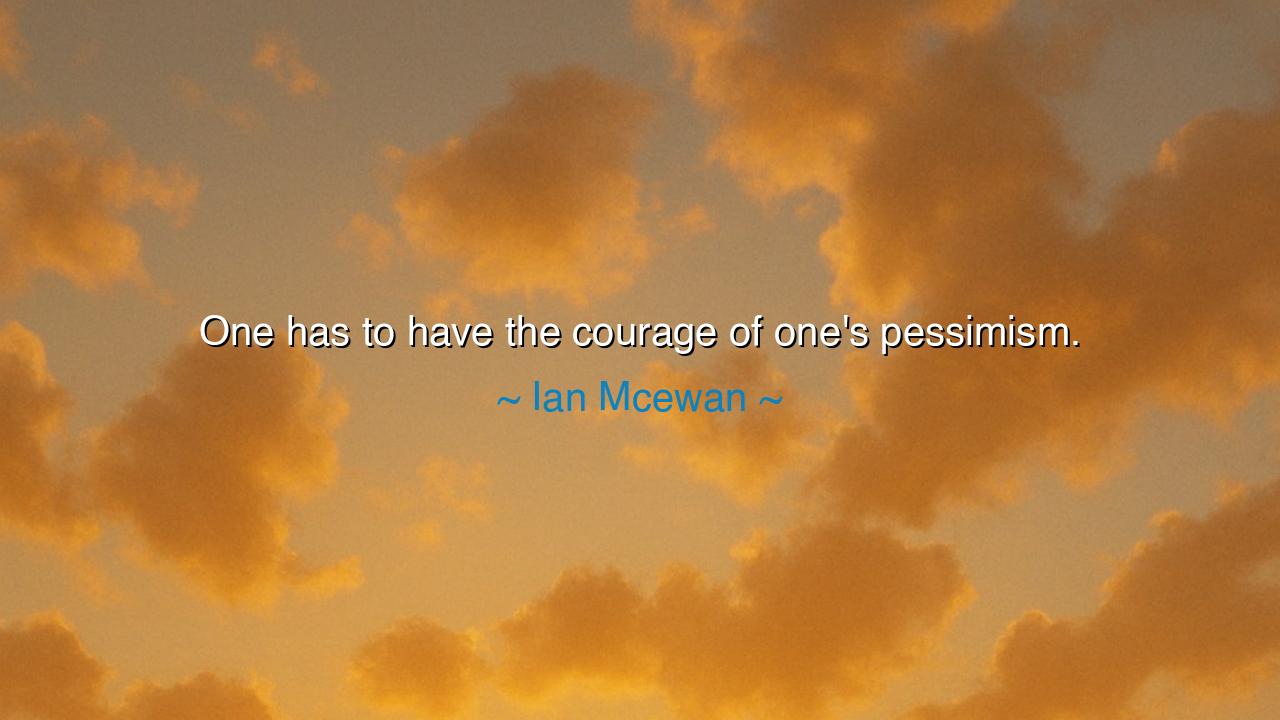
One has to have the courage of one's pessimism.






When Ian McEwan wrote, “One has to have the courage of one’s pessimism,” he offered a reflection both subtle and profound—a meditation on truth, courage, and the limits of hope. To the careless ear, it may sound like a surrender to despair, but it is not. Rather, it is a call to courage, a demand that one confront reality as it is, not as one wishes it to be. McEwan, a novelist who peers unflinchingly into the darkness of human nature, speaks here of the strength required to accept the world’s imperfection—to see clearly, to know pain, and yet not turn away. His words are a hymn to those who have the bravery not of illusion, but of insight.
For pessimism, in its truest form, is not weakness—it is the recognition that the world is flawed, that history repeats its cruelties, that goodness often walks unguarded among wolves. To have the courage of one’s pessimism is to stand before that truth and still act with integrity. It is to know that things may fail, and yet to move forward; to understand that man is fallible, and yet to love him still. This is no easy courage, for it demands endurance without promise of reward, faith without comfort, and wisdom without blindness. The optimist finds solace in hope; the pessimist must draw strength from honesty.
There is an ancient echo in McEwan’s thought, for the Stoics of old—Marcus Aurelius, Epictetus, and Seneca—taught that one must meet misfortune with composure, not because the world is good, but because the soul must remain steadfast. They too understood that courage is born not from certainty, but from clarity. The Stoic, like McEwan’s pessimist, knows that death, loss, and injustice will come, yet he does not curse the heavens or flee into illusion. He stands firm, saying: “I will not pretend the world is kind—but I will be.” That is the essence of moral strength: the refusal to let bitterness undo the heart.
Consider the life of Winston Churchill in the darkest days of the Second World War. He was no naïve dreamer. He knew the full measure of danger, the vastness of the enemy’s power, and the suffering that lay ahead. Yet he told his nation not that victory would come easily, but that it would require blood, toil, tears, and sweat. Churchill possessed the courage of his pessimism—the will to see horror plainly and still summon resolve. It was this grim clarity, this unwillingness to look away from the abyss, that gave him strength. His leadership was not built upon denial, but upon the truth that even in despair, there is duty.
McEwan’s wisdom asks us to find dignity in the face of disillusionment. To live with pessimism does not mean to abandon hope, but to purify it—to strip away false comfort and find what is solid beneath. The pessimist knows the fragility of human endeavor, yet still believes in the worth of striving. He builds the house knowing it may fall, loves knowing the heart may break, speaks truth knowing it may be ignored. Such a person does not seek victory in permanence, but in integrity. This is the courage of realism, the bravery to live truthfully in a world that often punishes truth.
In our own age, this courage is sorely needed. We are surrounded by noise, by empty promises, by those who tell us that everything will be well if we only close our eyes. But wisdom begins when the eyes open. To face the darkness of the world—corruption, suffering, and loss—and still choose to act with compassion and purpose, that is the mark of the strong soul. The coward hides in false optimism; the brave man faces reality and says, “Even so, I will continue.”
So, my child of truth and endurance, take this teaching into your heart: do not fear your pessimism. Do not silence the voice that warns, that questions, that mourns. Instead, give it courage. Let your realism be a forge, not a prison. See the world’s shadows clearly, but let that clarity deepen your kindness, your patience, and your resolve. For only when we cease to run from sorrow can we begin to act with wisdom. As McEwan teaches, to have the courage of one’s pessimism is to live honestly, love fiercely, and build bravely, knowing the world is imperfect—and to do all this, not in spite of that imperfection, but because of it.






AAdministratorAdministrator
Welcome, honored guests. Please leave a comment, we will respond soon